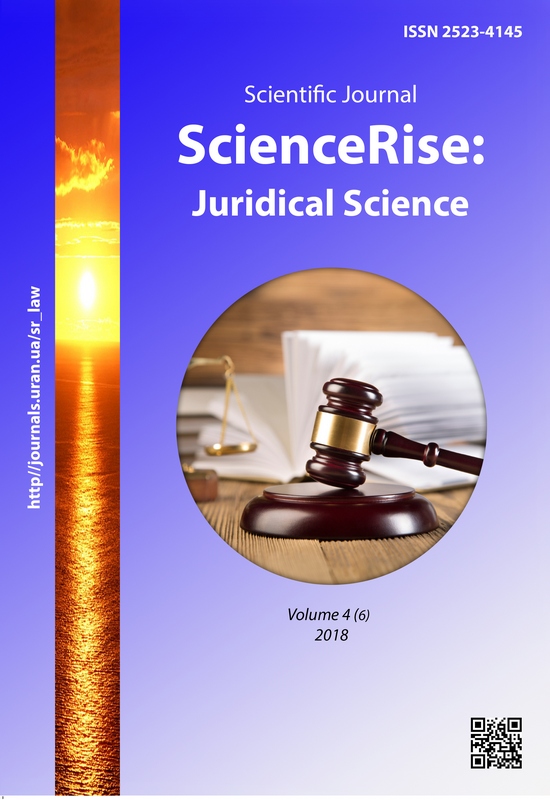Implementation of the independence principle in the implementation of certain types of legal activities
DOI:
https://doi.org/10.15587/2523-4153.2018.153483Keywords:
advocacy, independence, notary, principles, prosecutor's office, professional ethics, court, legal activityAbstract
This article is devoted to the modern problems of the implementation of the independence principle in the process of practical legal activity. Modern domestic science almost does not contain systematic and thorough researches of this problem. Scientific research is limited to specific branches of law or types of legal profession. Independence is one of the most important and significant legal principles that are embodied both in the process of creation and in the process of implementing legal norms.
The analysis of the main provisions of legal acts devoted to the regulation of various types of legal activity shows the following. The independence principle has been formalized at the level of law. However, different legal acts have different interpretations and the scope of the concept. Consequently, there is a difference in understanding and application of this principle by practitioners of legal professions. This negatively affects the level of their effectiveness, increases the external influence and the possibility of pressure.
The main problems in the process of implementing general legal principles are the following: the lack of legislative consolidation of certain principles of law, divergences in the definition of one and the same principle of law, in particular, the independence principle, in various normative legal acts, the contradictory nature of scientific positions regarding the concept and content of this principle of law , insufficient level of legal culture, skills and abilities, with which the legal practitioner can make logical conclusions regarding the separation and application of general principles of law, especially in the case of a gap in the right.
Consequently, it is considered necessary to achieve scientific consensus on the concept and content of the principles of law. The achievement of such a consensus should take place on the basis of the involvement of a wide range of representatives of science and the practical legal profession
References
- Skakun, O. F.; Bytiak, Yu. P., Yakoviuk, I. V., Chapala, H. V. (Eds.) (2008). Pravovi systemy v umovakh hlobalizatsiii. Problemy derzhavno-pravovoho rozvytku v umovakh yevropeyskoii intehratsiii i hlobalizatsiii. Kharkiv: Pravo, 10–13.
- Skakun, O. F. (2002). Yurydycheskaia deontolohyia. Kharkiv, 391.
- Husariev, S. D. (2007). Yurydychna diialnist: metodolohichni ta teoretychni aspekty. Kyiv, 35.
- Shmotkin, O. V. (2002). Yurydychna deontolohiia. Kyiv, 409.
- Zhalinskii, A. E. (1997). Professional'naya deyatel'nost' yurista: Vvedenie vspetsial'nost. Moscow, 268.
- Slyvka, S. S. (2003). Yurydychna deontolohiia. Kyiv, 506.
- Pohrebniak, S. P. (2008). Osnovopolozhni pryntsypy prava (zmistova kharakterystyka). Kharkiv: Pravo, 240.
- Petrova, T. V.; Marchenko, M. N. (Ed.) (2005). Istochniki ekologicheskogo prava. Istochniki rossiyskogo prava: voprosy teorii i istorii. Moscow, 295.
- Livshits, R. Z., Nikitinskiy, V. I. (1974). Printsipy sovetskogo trudovogo prava. Sovetskoe gosudarstvo i pravo, 8, 31–39.
- Tinovyi zvit «Advokatura Ukrainy: uroky pershykh rokiv samovriadnosti» (2018). Kyiv, 86. Available at: http://parlament.org.ua/wp-content/uploads/2018/09/Shadow_Report_Bar_19.09.2018pdf-1.pdf
- Savenko, M. D.; Stashys, V. V. et. al. (Eds.) (2006). Nezalezhnist suddiv ta ii pravove zabezpechennia. Etychni ta pravovi problemy zabezpechennia nezalezhnosti suddiv. Kharkiv; Kyiv: TsNT «Hopak», 98.
- Shchodo zabezpechennia dii pryntsypu verkhovenstva prava, zakhystu prav i svobod liudyny ta hromadianyna, utverdzhennia i zabezpechennia yakykh e holovnym oboviazkom derzhavy (2018). Rishennia Rady suddiv Ukrainy No. 22. 18.05.2018. Available at: http://zakon.rada.gov.ua/rada/show/vr022414-18
- Pro prokuraturu (2014). Zakon Ukrainy No. 1697-VII. 14.10.2014. Available at: http://zakon.rada.gov.ua/laws/show/1697-18
- Kravchuk, V. (2010). Vladni povnovazhennia prokurora: teoretyko-pravovyy aspekt. Vdoskonalennia diialnosti prokuratury – shliakh do reformuvannia kryminalnoii yustytsiii. Lviv: Halytskyi druk, 68–72.
- Dobrovolskyi, D. M. (2017). Nezalezhnist yak zasada orhanizatsii ta diialnosti orhaniv prokuratury. Odessa, 195.
- Sushchenko, V. (2017). Skilky koshtuie nezalezhnist prokuroriv? Available at: https://www.pravda.com.ua/columns/2017/11/27/7163206/
- Pro zatverdzhennia Pravyl profesiinoi etyky notariusiv Ukrainy (2013). Nakaz Ministerstva yustytsii No. 2104/5. 04.10.2013. Available at: http://zakon.rada.gov.ua/laws/show/z0424-13
- Zahalnyy kodeks pravyl dlia advokativ krain Evropeyskoho Spivtovarystva (1988). Strasburh. Available at: http://zakon4.rada.gov.ua/laws/show/994_343
- Muratova, N. G. (2004). Sistema sudebnogo kontrolya v ugolovnom sudoproizvodstve: voprosy teorii, zakonodatel'nogo regulirovaniya i praktiki. Ekaterinburg, 43.
- Boikov, A. D. Nezavisimost advokata. Available at: http://dom-i-zakon.ru
- Lisova, Yu. (2017). Nezalezhnist ne dorivniuie vsedozvolenosti. Available at: http://yur-gazeta.com/publications/practice/inshe/nezalezhnist-ne-dorivnyue-vsedozvolenosti.html
Downloads
Published
How to Cite
Issue
Section
License
Copyright (c) 2018 Nataliia Perepelytsia

This work is licensed under a Creative Commons Attribution 4.0 International License.
Our journal abides by the Creative Commons CC BY copyright rights and permissions for open access journals.
Authors, who are published in this journal, agree to the following conditions:
1. The authors reserve the right to authorship of the work and pass the first publication right of this work to the journal under the terms of a Creative Commons CC BY, which allows others to freely distribute the published research with the obligatory reference to the authors of the original work and the first publication of the work in this journal.
2. The authors have the right to conclude separate supplement agreements that relate to non-exclusive work distribution in the form in which it has been published by the journal (for example, to upload the work to the online storage of the journal or publish it as part of a monograph), provided that the reference to the first publication of the work in this journal is included.









